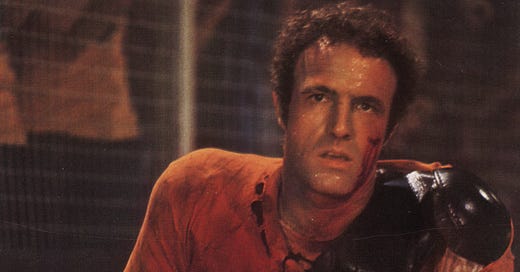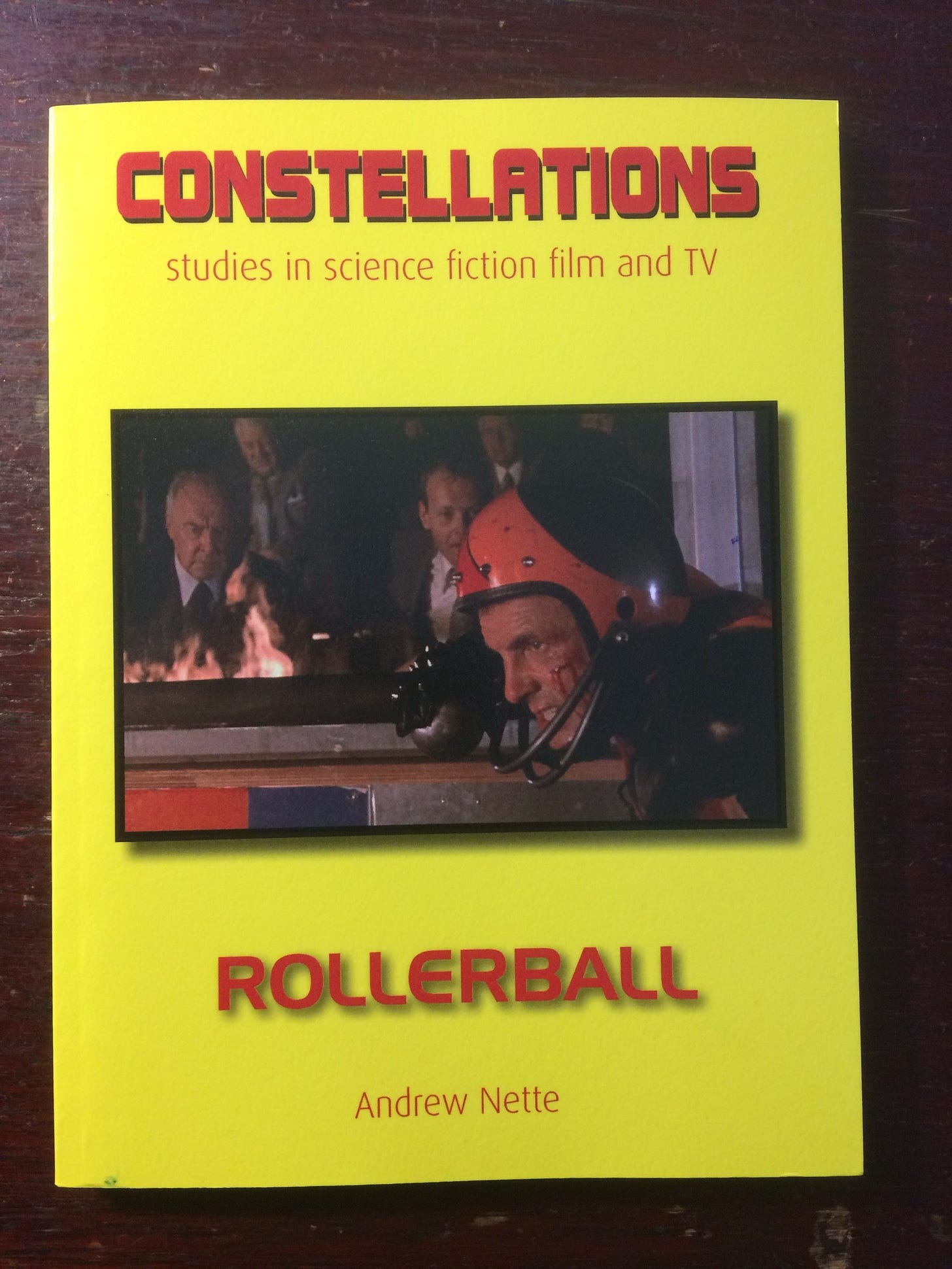I am a few days late to the party but, nonetheless, it would be remiss of me not to comment on the 50th anniversary of Norman Jewison’s 1975 dystopian science fiction classic, Rollerball. After all, I like this film so much, I wrote a monograph on it (but more on that later).
Jewison’s 1975 vision of a future dominated by anonymous corporations and their executive elite, in which individual effort and aggressive feelings are subsumed into a horrifically violent global sport, remains a key entry in 1970s science fiction cinema. A film that was widely derided by critics for its violence, was and still reads as a sophisticated and prescient take on such concerns as corporate dominance, ‘fake news,’ and declining literary and historical memory. And, of course, there are the stunningly dramatic and visceral game scenes, all done without the aid of special effects, which are still thrilling to watch today.
The film - released in US cinemas on June 25th 1975 - arrived at the tail end of a fascinating period in SF cinema. Between Stanley Kubrick’s 1968 2001: A Space Odyssey, which virtually single handedly lifted SF out of the low budget, poor special effects pulp and space opera influenced films of the 1950s and early 1960s, and the arrival of Star Wars in 1977, which of course changed science SF cinema and the film industry in general. In near decade between them, a raft of films, heavily influenced by the New Wave of science fiction appeared, in which extraterrestrial visitors and space conquering heroes, gave way to narratives concerning environmental destruction, over-population, the dark side of technology development, authoritarian rule and unchecked corporate control.
Rollerball takes place in a future in which war and hunger have been eliminated and nation states have disappeared. In their place is a global network of six major corporations, overseen by an elite executive class. Society is strictly regimented, with executives at the top. Recognising that such a society needs an outlet for aggression, the corporations have developed a violent global sport. Of course, Jewison’s film was not the first film to imagine a future earth in which violent televised spectacles are used to entertain, cover and pacify populations. It is part of a much larger body of cinema, which I termed ‘murder game films’ in my monograph. This is a large and broad cinematic output that spans reality TV parodies, Italian exploitation cinema and B-movies, mainstream science fiction and YA dystopian films.
Here five of my favourites.
The 10th Victim (1965)
The film that anticipates televised game shows in which contestants kill each other for money, what is not to like about leftist Italian director Elio Petri’s dark parody of a future in which war has been outlawed and replaced by a televised spectacle called ‘The Big Hunt’. Part comedy, action film, and romance, it boasts the star power and sex appeal of Ursula Andress and Marcello Mastroianni, as the two main contestants, a wonderful 1960s pop art vibe and a terrific soundtrack, all drenched in wonderful Italian sunshine.
The Game of Millions (1970)
Tom Toelle’s West German TV loose adaptation of The 10th Victim features a televised game show in which an individual must survive for seven days on the run while being pursued by a group of people out to kill them. What really works about this film is the way Toelle blends in elements designed to heighten the sense of realism, which make it feel like the nightmarish telethons which used to be a staple of commercial television. These include the show’s own theme song and dancers, cheesy variety acts, lurid advertisement breaks, and a behind the scenes look at the highs and lows from the perspective of the production crew.
Series 7: The Contenders (2001)
Six people selected at random in a government lottery stalk each other through dreary outer suburban America. I didn’t fully appreciate how good this film was when I first saw it, soon after it came out. Or perhaps reality television hadn’t developed to such a point where I could recognise its tropes and stylistic flourishes so clearly. Series 7 brilliantly mimics the real thing. Everything from the voiceovers, music, and look, to the on air prodding of the already dangerously close the edge Middle America contestants, including reigning champion, an eight month pregnant psychopath doing it all for her unborn child.
Network (1976)
Although not normally viewed as a murder game film, Sidney Lumet’s take on an unhinged network news anchorman who suffers a public breakdown that propels him into a role top rating angry on-air prophet, is a stunning take on violent public spectacles. Whether directly influenced by Rollerball or because scriptwriter Aaron Chayefsky and Lumet were feeding off the same cultural zeitgeist, Network probes many of the same themes as Jewison’s film, including out of control corporate power and the violence swirling throughout America in the 1970s.
Rome 2072: The New Gladiators (1984)
Lucio Fulci’s effort is one of the most direct Rollerball rip-offs and the best of the Italian post-apocalyptic or ‘pasta-apocalypse’ films that appeared in the first half of the 1980s. Set in a brutal corporate dominated future two television networks compete for ratings by producing ultra-violent game shows. Rome 2072 includes plenty of leather, lots of motorcycle action, and a device called a ‘hate simulator’, designed to measure the point a human can be provoked into murder.
And, if you are interested in more film recommendations, here is the Letterboxd list I made of every film mentioned in my Rollerball monograph.
So, yes, now it’s time for me to pimp my monograph, which is available here from Liverpool University Press, as well as various other online platforms. Drawing on numerous sources, including little examined documents in the archive of William Harrison, who wrote the short story it is based on and adapted it for the screen, my book examines not only the making and reception of Rollerball, but the elaborate and painstaking process of world creation undertaken by Jewison and Harrison. The monograph also unpacks the cultural forces and debates that influenced the two of them, including fear of corporate power and growing violence in Western society in late 1960s and early 1970s.
Last, but by no means least, the includes an interview with Jewison on Rollerball and its influences, making and reception. Indeed, I am pretty sure it might be the last interview the director gave before his death in 2024.






Good post and I love your monograph on ROLLERBALL. Makes me feel old to read about it. I first saw it when it was released back in 1975. I was 25 at the time.
Great piece - my dad took me to see Rollerball on release, sneaking me in a year too young for the AA certificate! Only gets better rewatching it! But no Death Race 2000 in your list!? 😉